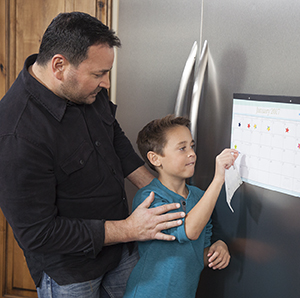Bedwetting isn’t something your child does on purpose. Never punish or tease a child for wetting the bed. This could make the problem worse. It could make your child feel ashamed and embarrassed. Instead, be positive and supportive. Praise your child for success. And even for trying hard to stay dry.
Tips that may help
-
Get your child involved. Encourage your child to take responsibility for changing a wet bed during the night.
-
Put up a calendar or chart. Give your child a star or sticker for nights that they don't wet the bed.
-
Put night lights in the bedroom, hallway, and bathroom. These may help your child feel safer walking to the bathroom.
-
Keep a plastic bag or laundry basket in the room. This can hold wet sheets and pajamas.
-
Protect the mattress with a waterproof cover. Put an absorbent pad on the bed. Or keep extra sheets or dry towels in the room. If your child wets during the night, they can get up. They can remove the pad and change the sheets. Or put a dry towel over the wet spot.
-
Make overnight trips as easy as possible. If your child goes to a sleepover party, hide a disposable diaper in the bottom of the sleeping bag. This can be slipped on under their pajamas. Also ask the child's healthcare provider about medicines that may help control bedwetting for a night or 2 for children 6 years or older.
-
Waking your child up to use the bathroom may prevent a wet bed that night. But it won’t make your child outgrow the problem any faster.
Growing up
Children mature at different rates. Some kids don’t walk, talk, or grow as quickly as others. And some take longer to stop wetting the bed. This doesn’t mean something’s wrong. Be patient and understanding. This will help your child overcome bedwetting, without hurting their confidence or self-esteem. If your child suddenly begins bedwetting after being completely toilet trained for 6 months or longer, contact your healthcare provider. There may be a medical problem that needs treatment.
Featured in


